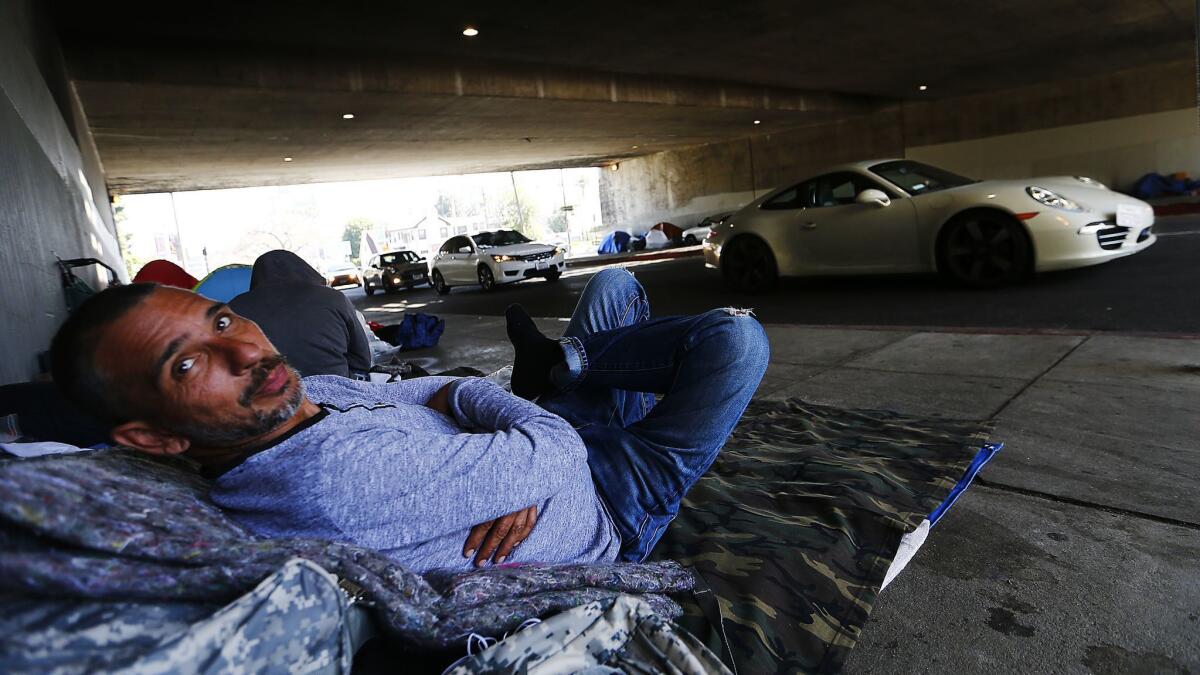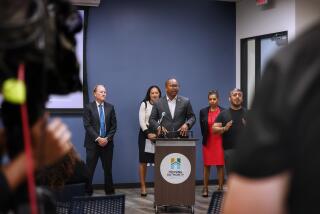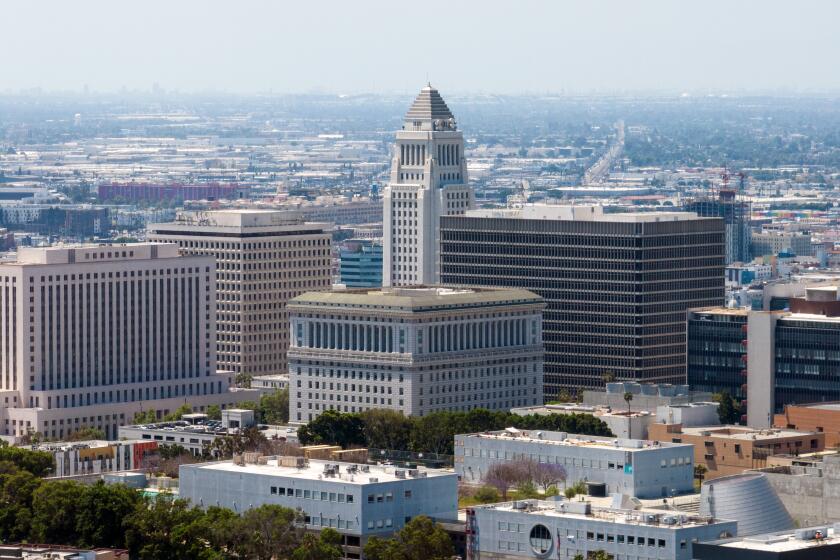City Beat: The homeless make us ashamed and angry — at our city and at ourselves

Some news hits like a punch in the gut. It makes your jaw throb from teeth gritting.
The new homeless numbers have left a lot of people who live in houses and apartments in Los Angeles feeling walloped. By the vastness of the problem. By its complex tangle of hard-to-fix causes, led by the high cost of housing. By the apparent inadequacy — despite millions spent and expanded outreach and more than 21,000 additional people housed — of current efforts to alleviate it. By the clear signal that what’s happening will not stop happening soon and may even get much worse.
But also by a combination of anger and shame, both on a civic and a personal level.
When the news broke Tuesday that city and county homeless numbers had gone up 16% and 12% respectively between this year and last, I reached out to L.A. residents on social media to ask how they felt about it, what they thought should be done and how they viewed their own personal responsibility. That evening, I also staked out my own polling place in Hollywood, in search of the kind of civic-minded citizens who made the effort to vote on a parcel tax for schools when it was the only item on the ballot.
One thing I heard a lot was outrage at politicians’ claims that they were stunned by an increase in the homeless population. How could you move around the city and not know that to be true, said person after person I talked to.
Spencer Windes, a third-generation Angeleno, articulated his wide-ranging ire in an email.
He said he was angry at our elected officials’ failure “to grasp and articulate the magnitude of this crisis and to lead on it” and angry that our mayor “spent much of last year toying with running for president while our city was burning.” He was angry, too, at the city council and at “NIMBY homeowners” who — despite the fact that a majority of people here now rent — still hold “a 20th-century vision of Los Angeles as an overgrown suburb” and exert undue power to block projects in their neighborhoods that are aimed at getting people off our city streets.
City Beat: The loneliness problem in L.A. starts with traffic. Could it end with a walk? »
But “most of all,” he said, he was angry at himself — for doing little personally to help, directly or indirectly.
“When there is a breach in the dike, everyone in the village is at risk and everyone in the village is responsible,” he wrote, with the caveat that those with power are more responsible than others.
Similar feelings churn within me constantly. Often anger at civic leaders and greedy developers is at the forefront. Sometimes it’s almost pure personal shame at all that I have and how little I share, and the limitations of my own put-yourself-in-their-shoes forbearance. Frequently, as I walk the streets of my city, the conflicting emotions war in my mind.
Yesterday, a lot of people told me of their similar internal battles.
Of their shame and anger over living in a city where a few minutes’ drive separates mansions in the hills from trash-strewn tent encampments. Of their anger and shame about the rats and typhoid fever likely from those encampments that have now scratched their way into a downtown police station, our own postcard-perfect City Hall and even our international reputation.
They expressed fury at politicians for not tackling the crisis with the kind of all-out urgent, drop-everything-else response they so ably summon for earthquakes and wildfires that arrive without this situation’s years of warning and build-up.
“Honestly Eric Garcetti seems more concerned about his Instagram feed than doing anything,” Meaghan Murphy, who lives in an apartment complex near skid row, told me. “It just infuriates me. I go to his Instagram feed and there’s all these beautifully curated sunsets in L.A. I mean, how does he have time to do that?”
They also admitted embarrassment about not writing to politicians to demand faster action, not giving to nonprofits that try to help, not so much as handing a sandwich to a hungry person in need, not looking at the encampments and putting compassion and sadness for the people who live in them before fury at their continued existence on our sidewalks, in our parks, under our freeways, outside our doors.
Some said they had other causes: animal welfare, LGBTQIA rights. Some simply didn’t see how they individually could have any real effect on such a tsunami of need.
“It just breaks my heart but it’s also disheartening,” Kristi Dick told me of her experience of walking around her Hollywood neighborhood. “I feel frozen because I don’t know what I can do.”
Nearly 59,000 people now are homeless in our county. That’s 3,000 more than a completely packed Dodger Stadium can hold.
Over 36,000 people have no homes in our city. Think two times the crowd at a sold-out concert at the Forum.
The people I spoke to and heard from offered up plenty of suggestions for getting at the problem. Charge property owners a hefty tax for leaving the much-needed housing they own vacant. Loosen regulations to allow for tiny homes and tiny-home communities. Find vacant land to create communities offering shelter along with medical services, counseling, rehab and job training. Force the people on the streets who clearly cannot take care of themselves into some sort of hospital care. Cap rent increases for all housing. Demand substantial affordable housing without exception in all new multi-unit housing.
Anika Malone, who told me she and her husband are currently scrambling to find housing they can afford for their family of four after their landlord gave them a notice to vacate their El Sereno home, said property owners could do their part by cutting people some slack, maybe not going for maximum rent and maximum profit if it was within their means to accept less.
One block from my polling place, just off Franklin Avenue, I passed two RVs that clearly were homes on wheels, as well as a man sitting on the pavement, gesticulating and shouting to himself, surrounded by garbage in a mini-mall alley. Three blocks to the east was an underpass encampment that often has more than a dozen tents. Two blocks to the west were more tents, in another underpass and on patches of median between streets.
This is in a council district where — according to the latest numbers — homelessness went up by 53%, the highest percentage in the city, in the past year. In a district where nearly a third of that population has either a substance abuse disorder (9%) or serious mental illness (20%). In a neighborhood where fears about that nearly one-third run rampant, turning chat rooms into panic rooms.
It was just under six months ago that our city seemed to be coming together in support of our striking public school teachers. Citizens all over the city were joining them on the picket lines, honking their horns in solidarity, absorbing and supporting their calls for the smaller classes sizes and increased support staff that Measure EE was intended to fund.
The measure, which needed two-thirds approval, got under half the vote. Only about 12% of voters appear to have shown up.
Some who did told me yesterday that their anger at the lack of progress on the homelessness crisis influenced their decision to vote down the parcel tax. Why give their money to another big bureaucracy, they said, that would be unlikely to spend it efficiently?
One person said that if a lack of affordable housing was landing more and more people on the streets, he didn’t want to play a role by increasing already hefty property taxes.
Most people I spoke to outside the polls didn’t want to give their names. They said homelessness had grown to be such a divisive issue that they rarely talked about it with others or joined in discussions on their neighborhood message boards.
When I heard the new homeless numbers, I thought to myself: We need, as a collective we, to make our voices heard, to demand of our leaders — local, state and national — the kind of action that will tackle this problem from all its sides at once. We should be filling the streets of downtown in massive marches, as we’ve done for other causes.
But to do that we need to make the effort to speak out. We need to be willing to sacrifice. We need to find a way to come together.
Outside my polling place, I sat mostly alone. Over more than two hours after 5 p.m., during the prime time for polls, when people head home from work, I counted just over two dozen arriving to perform their civic duty. Regardless of how they landed on the parcel tax, more people should have been showing up.
I couldn’t help but feel that same familiar twist of shame and anger.
More to Read
Sign up for Essential California
The most important California stories and recommendations in your inbox every morning.
You may occasionally receive promotional content from the Los Angeles Times.











